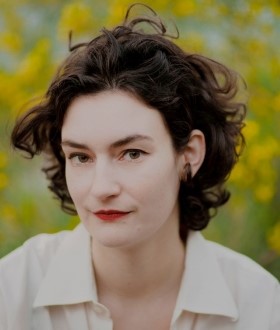Berlin Fellowship 2023 — Architecture

Fanny Brandauer
*1992, Vienna (AT)
Lives in Berlin (DE)
Insta: @fannybrandauer
www.atlasoflandscapesinaroom.com
Insta: @atlasoflandscapesinaroom
Vita
Fanny Brandauer is a landscape architect based in Berlin and Munich. Her work is characterised by transdisciplinarity at the intersection of landscape architecture, visual art and the curatorial field. She explores and reflects on the presentation, sensual perception and communication of landscapes in spaces for exhibition, art and culture.
In 2021, she launched the "Atlas of Landscapes in a Room" project – a digital indexed reference work for landscapes that are exhibited indoors. She is also actively teaching in addition to various installation exhibition works indoors and outdoors (most recently the Baumschule Kulturforum and the Berlin Art Week Garden together with atelier le balto and Neue Nationalgalerie/Stiftung St. Matthäus).
Fanny Brandauer is a graduate of BOKU Vienna and TU Munich. From 2018 to 2022, she worked as a project and team leader at the internationally renowned Studio Vulkan Landschaftsarchitektur Munich/Zurich.
In 2023 she was a scholarship holder of the Fonds Darstellende Künste at the Pathos Theater Munich. In 2019, her Master's thesis was awarded the bdla Young Talent Award (Association of German Landscape Architects) and the TUM School of Life Sciences Award as an outstanding final thesis. In 2017 she was shown at documenta 14 in Athens.
Residency
I would like to use the residency to advance my research on the possibilities of exhibiting landscapes indoors and to investigate the exhibition medium's potential for the discipline of landscape architecture. The focus will be on the relationship between landscape and art.
The stay will also serve to conceptualise and prepare a publication. The basis for this is my Master's thesis "Exhibiting Landscapes. On the Transfer of Landscapes into Interior Spaces" (2018). The publication is intended to present positions from different artistic, scientific, and planning disciplines and to relate them to each other. Another aspect is determining the reason why landscape architectural positions have so far played a marginal role in art and culture.
Mentor: Regine Keller